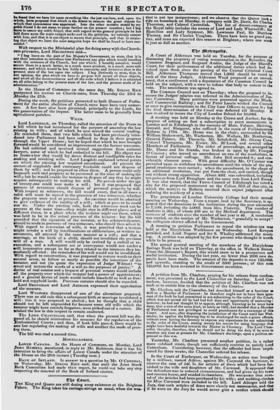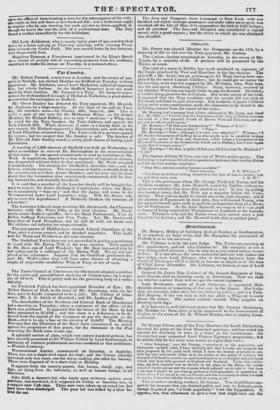A petition from Mr. Charlton, praying for his release from
confine. ment, was presented to the Lord Chancellor on Saturday. Lord Cot- tenham, however, decided that the petition of Alr. Charlton was not such as to entitle him to the clemency of the Court— Mr. Charlton, said the Chancellor, had described himself as a barrister as well as a Member of Parliament : he therefore ought not to have been igno- rant of the fault he had committed in not subniitting to the order of the Court, which was not served till he had had full time and opportunity of answering: however, he had not thought fit to appear, although knowing as he must bare done, that a case of the same kind, so lately as 1831, had decided that a Member of Parliament was not privileged to avoid punishment for a contempt of this Court. And now, after disputing the jurisdiction of the Court until last Wed- nesday, he applies the following day to be discharged for, such a grave offence, without even having the decency to express any repentance for not submitting to the order of the Court, stating merely his sorrow for using language that might have been doubtful towards the _Master in Chancery. The Lord Chan- cellor thought, therefore, that he should not be doing his duty if he were to mention any time at present for Mr. Charlton's discharge, upon a petition ex- pressed as this was.
Yesterday, Mr. Charlton presented another petition, in a rather more subdued strain, though not sufficiently contrite to satisfy Lord Cottenham. Considering, however, that the offender had been impri- soned for three weeks, the Chancellor ordered his release.
In the Court of Exchequer, on Wednesday, an action was brought by a milliner, named Atkins, against Mr. Curwood the barrister, to recover the sum of Mt 7s. for articles of dress which bad been fur- nished to the wife and daughters of Mr. Curwood. It appeared that the defendant was in reduced circumstances, and had given up his town and country house, and resided in chambers. He was aware that seve- ral of the articles had been purchased by his wife; and wedding-clothes for Miss Curwood were included in the bill. Lord Abinger told the Jury, that such articles of dress were cleally not necessaries, and that if he were on the Jury he would never give a verdict which should nave the effeht.of incarcerating a man for the extravagance of his wife: ,se ought to live and dress as her husband did ; and a tradesman ought to inquire who he was trusting for such articles as those supplied, al- though he knew she was the wife of a professional man. The Jury found a verdict immediately for the defendant.



























 Previous page
Previous page